From the original article on November 16, 2021. Author: eugyppius.
Cornelia Betsch is a professor of health communication at the University of Erfurt.
We read that she “and her team work on understanding principles of health behaviour by applying a judgement and decision making and strategic interaction perspective to infectious disease control – especially with regard to the vaccination decision and prudent use of antibiotics.”
In other words: Prof. Dr. Betsch is a glorified pollster who studies the attitudes of ordinary people, so that government bureaucrats can figure out how to manipulate them more effectively. She is naturally also a truly odious vaccinator, author of a book called Fact Check: Vaccination (heavens preserve us), and leader of an Orwellian project called Corona Snapshot Monitoring, or COSMO. Under these auspices, she surveys the German population to inquire after “risk perception, protective behaviour and trust” in order to help policymakers devise more insidious policies.

Cornelia Betsch during a May interview with state media (Mitteldeutscher Rundfunk) about her new book Fact-Check: Vaccination.
Recently, Prof. Dr. Betsch gave a presentation to representatives of our incoming government, advising them on how they might nudge ever more people into accepting medical treatments that will not work, that they do not want, and that pose an overt danger to many of them. Then, because she is a totally clueless and tone-deaf person, she posted this presentation to Twitter. Below, my translation and commentary.
“Thanks to the Greens, the SPD and the FDP: Today there was a discussion with representatives of target groups, with many best-practice examples about how to promote vaccination against COVID-19. I was allowed to show COSMO data. Here, my presentation and its key points.”
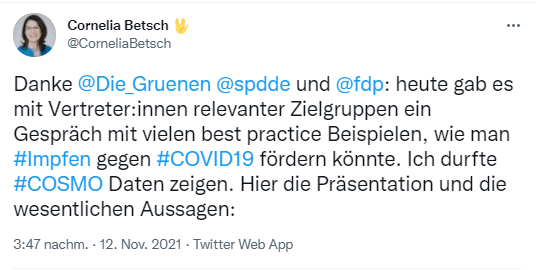
“Most people who want to be vaccinated, already are. How can we reach the unvaccinated? Why aren’t they vaccinated? I’ll present two analyses – one by region, the other by vaccination status.”
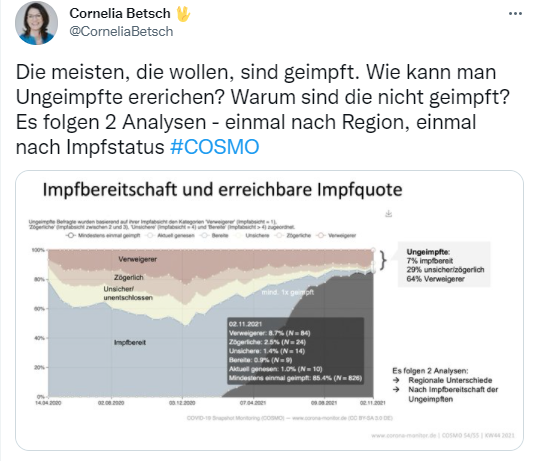
The slide portrays the results of running COSMO polls on vaccine hesitancy from 14 April 2020 to 2 November 2021. Her numbers show that today, among the unvaccinated, 7% are still open to vaccination, 29% are hesitant, and 64% are holdouts.
“By region: States with low vaccination rates have less readiness to be vaccinated, even among the unvaccinated [yes, you would think so - eug.], less confidence in vaccine safety, a lower risk perception of Covid, and less insight into how it benefits others.”
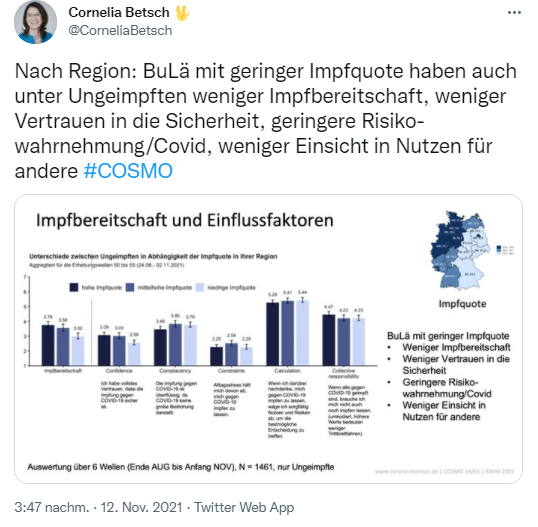
The slide provides COSMO polling data on “Vaccination Willingness and Influence Factors,” and does not even fully support what she’s saying.
“By willingness to be vaccinated: Those who are insecure and hesitant (29% of the unvaccinated) trust the safety of vaccination less than those who have been vaccinated; they are deterred primarily by practical barriers, and are more likely to wait for others to be vaccinated (free-riding, less sense of community).”
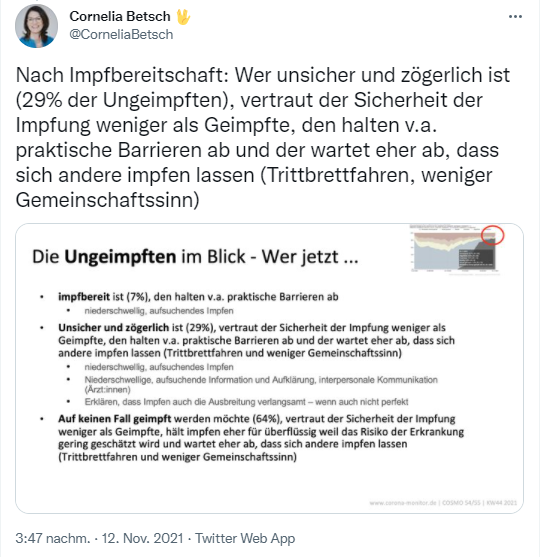
The slide repeats this point, with supplementary remarks that the 7% who are still willing to be vaccinated are deterred mostly by practical barriers. Easily available vaccine outreach programs are the way to reach them, we read. The same goes for the 29% who are hesitant. Here information campaigns and “interpersonal communication” are also recommended, along with “explaining that vaccination also slows the spread – though not perfectly.” Happily, Prof. Dr. has no strategies to recommend for the 64% who really don’t want to be vaccinated.
These trust the safety of vaccination less than the vaccinated, consider vaccination unnecessary because they assess the risk of infection as low, and would rather wait for others to be vaccinated (free-riding and less sense of community).
While Prof. Dr. Betsch obviously loves to scold people about free-riding, does anyone really believe that the hardcore refuseniks want others to be vaccinated to reduce their risk? Most people in this group want less vaccination, not more.
“About a third of respondents have (almost) never or only rarely been asked for proof of vaccination. Among the unvaccinated, those who have had to show proof more often have a slightly higher willingness to accept vaccination.”
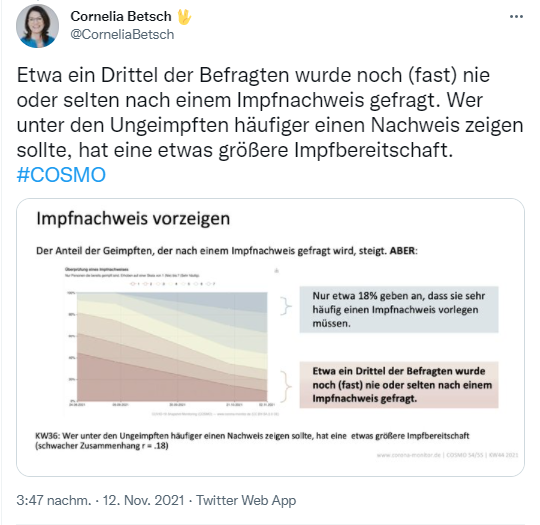
Get ready for everyone to ask you for proof of vaccination all the time. Containment has already turned many aspects of everyday live into an enormous hassle, and that will continue, because hassling you all the time about meaningless things has become a central, overarching goal of our technocracies.
“80% favour access restrictions such as 2G or 3G. (Reminder: 2G permits access only to vaccinated or recovered. 3G allows access to the unvaccinated, on the condition they present a negative test.) The 2G rule is significantly more popular than it was at the end of August, and is currently the favourite.”
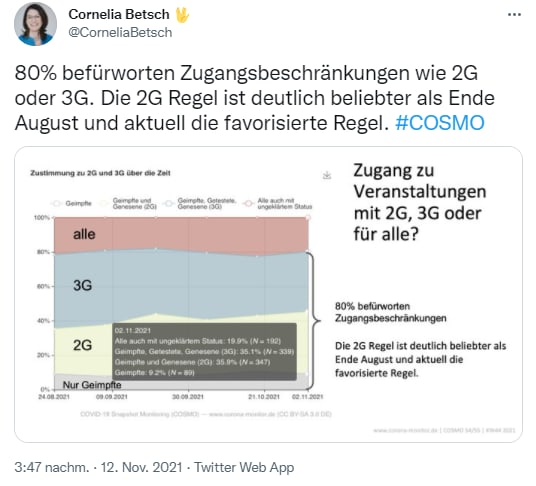
The slide again shows the results of running opinion polls on access restrictions. People who want 2G are now in the plurality.
Now things take a rather darker turn.
“Measures currently in place can also contribute to a sense of risk. Example: Where 2G was the rule in bars, people’s risk perception was higher than with 3G or without any access rules.”
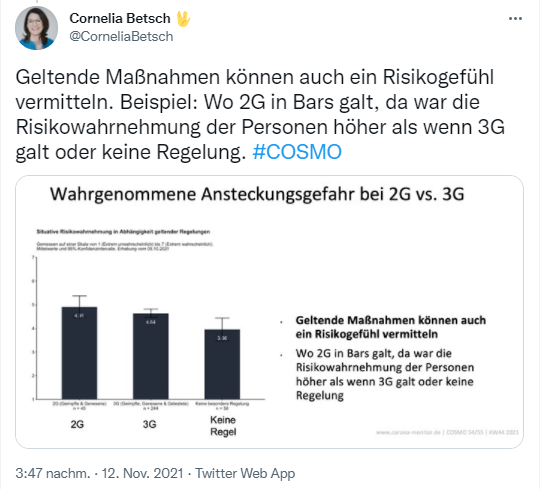
The slide, which again is astoundingly stupid, reports the results of a poll where respondents were asked to assess their risk of infection on a scale from 1 to 7. In places where bars were subject to 2G rules, average risk assessment was 4.91; with 3G, it was 4.64; and with no special rules, it was 3.96. Obviously everybody everywhere massively over-assesses their risk. Beyond that, she has it backwards: It’s far, far easier to believe that 2G rules reflect, rather than drive, local anxiety. Many people don’t even go to bars.
But no matter: There will be more 2G rules, not because they serve any health purpose, but because fools like Prof. Dr. Betsch think 2G rules scare people, and scaring people is good, because if people are scared they will more readily accept vaccination, which won’t stop Corona.
“Once again, we observe that when case numbers rise, a window of readiness to act opens – we become more cautious and seek protection (concerns about health and the health care system are currently on the rise again).”
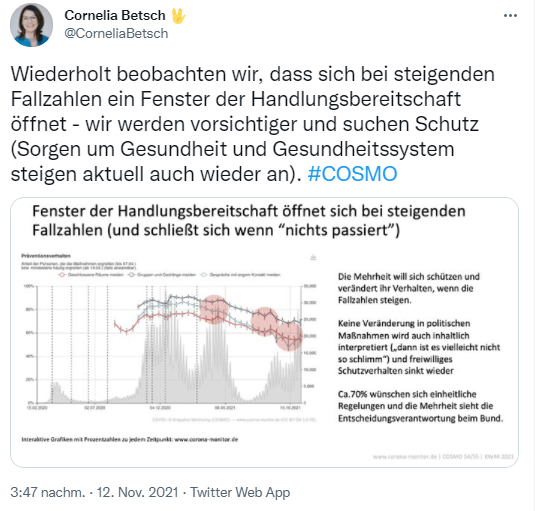
Her slide (which again does not clearly support her point but provides the sciencey aesthetic that is necessary for wannabes like professors of health communication) plots over time the readiness of respondents to avoid closed rooms, groups, and close conversations. The grey peaks and valleys are cases. On the right, we read:
The majority wish to protect themselves and change their behaviour when the case numbers rise.
No change in politically-mandated containment measures is taken as a message (“so I guess it’s not that bad then”) and voluntary protective behaviour sinks.
Around 70% want uniform rules and a majority place the responsibility to decide with the federal government.
There you have it: A professor of health communication openly advising the German government to adopt even senseless measures, on the off-chance this scares people into the arms of the vaccines.
“Also don’t forget antigen tests right now – even the vaccinated are willing to be tested. They need information: When, who, why, how often?”

The slide hilariously complains that “the number of antigen tests is declining” and that “over half of those surveyed haven’t been tested in the last four weeks.” Imagine. Also they have one survey showing that the vaccinated are more interested in getting tested than the unvaccinated.
“2/3 to 3/4 of respondents are in favour of vaccine mandates for certain professions. Stave off possible anger about this among those affected (outreach with information, offers of vaccination), but also take care to explain to the population why it’s necessary.”

The slide regrets that “currently only 29.7% of those surveyed unambiguously support a general vaccine mandate,” while mandates for healthcare personnel, policemen, teachers and so forth are generally supported. Mandates for thee but not for me. Then this funny bit: “Important: Intercept adverse psychological reactions (anger and reactions of defiance) with methods of communication.” That will work.
“And these were conclusions & recommendations – supplemented in part with other findings: Consider mandatory counselling for unvaccinated, mobile push notifications for booster vaccinations, readily available boosters for those who received the J&J vaccine, information on antigen tests also for vaccinated, and more.”
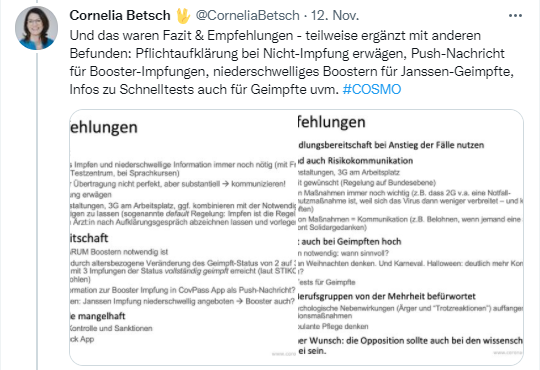
There are a few additional disturbing points in the concluding slides. She wonders about how vaccination might be constructed as the default status, by requiring doctor’s certification that the unvaccinated have endured the mandatory counselling. She also proposes increasing the definition of “fully vaccinated” for at least older age brackets from 2 to 3 doses.
To emphasise an old point of mine: There is a brief period, in the life of any given containment measure, when it is earnestly and pragmatically implemented. Then it fails, but rather than being retired or removed, it experiences a kind of apotheosis – an elevation to doctrine – as it becomes an end in itself. It has never been more important to vaccinate everyone, now that everyone realises the vaccines don’t do very much about infections. Spiking cases actually represent an opportunity for the state to impose more restrictions, particularly on the unvaccinated. This will do nothing about infections, but it may drive the vaccination rate a little higher, which has become one of the highest goals of the German government.
Library of Chadnet | wiki.chadnet.org